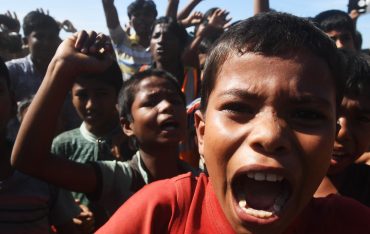In November 2023, several countries followed through on their earlier commitments to intervene in the Rohingya genocide case, supporting The Gambia against Myanmar at the International Court of Justice (ICJ). Events on the battlefield have also shifted the military balance, which could affect the prosecution of crimes at the ICJ and other international courts.
On November 15, 2023, two interventions – one from the Republic of Maldives and a joint intervention from Canada, Denmark, France, Germany, the Netherlands and the United Kingdom – were deposited under Article 63 of the ICJ Statute. If found admissible, the court’s judgment would bind both the parties and the intervenors.
Six years after the 2017 Rohingya massacres and four years after The Gambia launched the ICJ proceedings, legal interventions have increased the jeopardy facing Myanmar’s military leadership, including coup leader Senior General Min Aung Hlaing.
The most recent joint intervention notably included two permanent members of the UN Security Council – the United Kingdom and France – and other influential European countries such as Germany.
Yet the Federal Public Prosecutor General of Germany refused to take up a universal jurisdiction case lodged by the NGO Fortify Rights. The case alleged genocide, war crimes and crimes against humanity by the military against the Rohingya, as well as crimes against humanity since the February 2021 coup.

The Prosecutor General noted the absence of Min Aung Hlaing and other named perpetrators from Germany, as well as Germany’s ongoing cooperation with other international legal processes such as the Independent Investigative Mechanism for Myanmar, as decisive factors for not delivering the case.
At the same time as these international legal developments are unfolding, the Myanmar military faces potentially catastrophic losses on the battlefield which could bring about an existential crisis for the junta. Ethnic armed groups have gained the upper hand in various parts of the country following the success of Operation 1027 on October 27, 2023.
The Three Brotherhood Alliance conducted the operation, capturing two major border towns in northern Shan State and overrunning more than 120 military posts and bases.
This offensive was accompanied by attacks on military forces in eastern Myanmar by ethnic Karenni and Karen resistance forces. Major offensives occurred in the central Sagaing Region, where the Peoples’ Defence Forces allied with the exiled opposition National Unity Government (NUG) to capture the town of Kawlin.
The NUG announced in early December that Kawlin was the first district-level town captured by Myanmar resistance forces to begin operating under a fully functional civilian administration.
In mid-November 2023, the powerful Arakan Army – a member of the Three Brotherhood Alliance – broke a 12-month-ceasefire with the Myanmar military in western Myanmar’s Rakhine State. They seized border guard outposts and attacked regime forces in four major townships, resulting in tens of thousands of displaced villagers. In neighboring Chin State, ethnic armed groups seized at least two towns, resulting in thousands more displaced villagers crossing into India.
These attacks have prompted a significant shift in the direction of the civil war. A conflict that has been marginalized in global politics – first by Ukraine and more recently by Israel and Gaza – is now garnering global headlines for the first time since the coup. The significance of this shift was underscored on December 4 when the Washington Post published a front-page story on the Karen National Union ethnic armed group.
Questions about the nature of a post-conflict civilian government accompany this shift in sentiment. The exiled NUG emphasizes that it will build a federal Myanmar based on its Federal Democracy Charter if it takes power. But ethnic armed groups have been repeatedly disappointed by governments led by the majority Bamar ethnicity, who dominate the Myanmar military and comprise much of the NUG.
If the current trajectory continues, the various ethnic armed groups could dwarf the NUG’s influence over the construction of a potentially democratic and federal state.
The Arakan Army continues to keep the NUG at arm’s length, partly due to their demand for post-military Myanmar to be a confederation of independent states, where the Rakhine people would largely determine their own future. But any of these options are still a considerable distance away.
The military leadership is aware of the international court cases building against them and the consequences that await them if they lose. There are still various strategies the military could adopt to remain in power, including strategic retreats from vulnerable or contested border regions.

But good options are diminishing in the face of resurgent opposition.
The events over the past two months in Myanmar suggest Min Aung Hlaing may not be as secure in Naypyidaw as once believed.
While it is still early days, the odds for an opposition victory have shortened and rivals in the military may view the deliverance of Min Aung Hlaing as acceptable leverage in any potential dealmaking. He may well end up visiting both Germany and the Netherlands in his retirement.
Adam Simpson is Senior Lecturer in International Studies at the University of South Australia.

